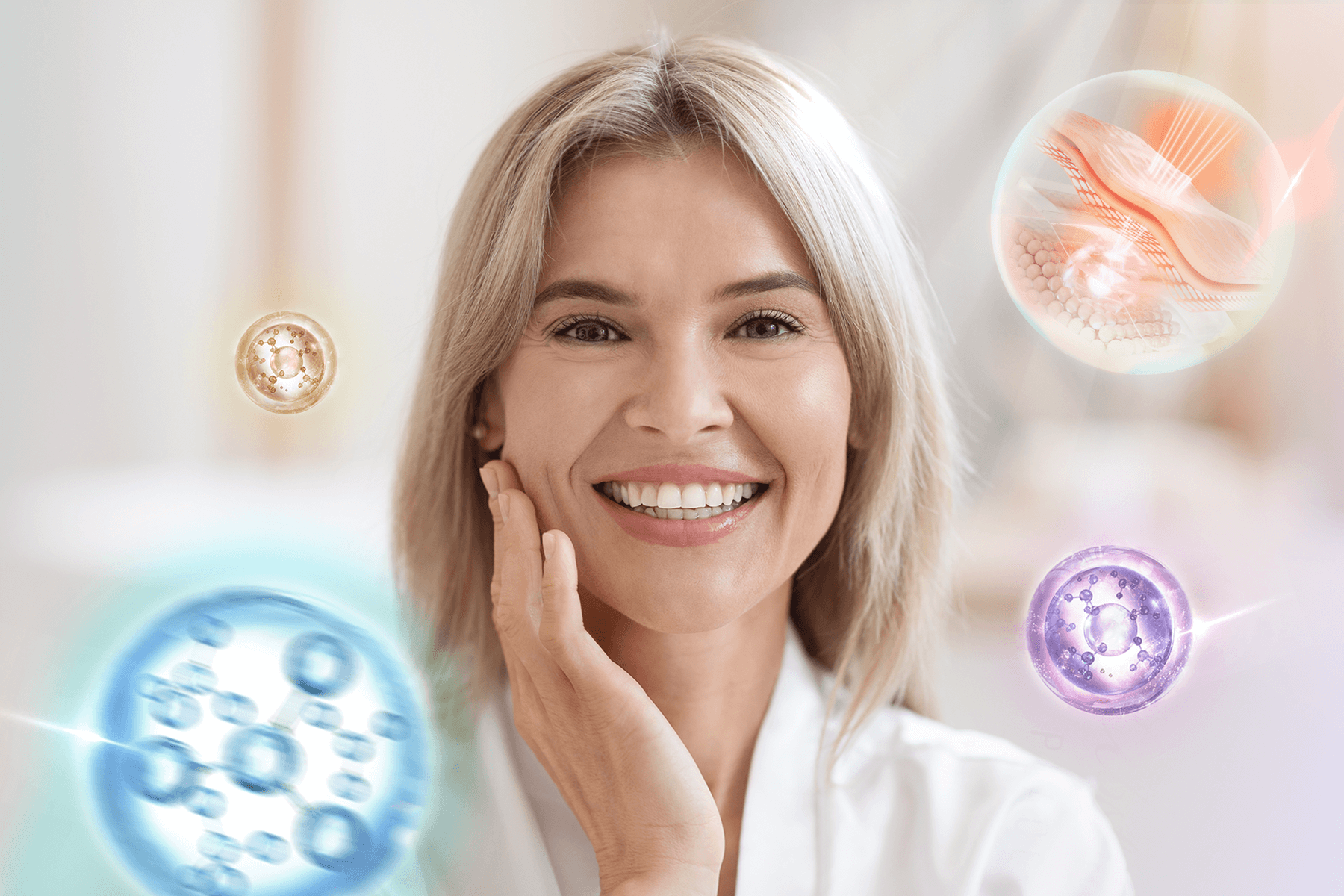Sleep is a vital component of our daily lives, playing a crucial role in maintaining overall health and well-being. While many people focus on their waking hours to care for their skin, the truth is that the quality and duration of sleep have a significant impact on skin health. At Aduro, we understand the connection between sleep and skin health, and we believe that by understanding the science behind this relationship, you can optimize your skincare routine and achieve a more radiant, youthful complexion.
The importance of sleep for skin health cannot be overstated. During sleep, our body undergoes numerous restorative processes that are essential for maintaining healthy, glowing skin. From the production of collagen and elastin, which keep our skin firm and elastic, to the repair of daily damage caused by environmental stressors, sleep is a critical time for skin rejuvenation.
The quality of our sleep can also have a profound impact on our skin's appearance. Poor sleep quality or chronic sleep deprivation can lead to a range of skin issues, including premature aging, dark circles, and even acne breakouts. On the other hand, getting sufficient, high-quality sleep can help keep our skin looking its best, promoting a more even skin tone, reducing the appearance of fine lines and wrinkles, and enhancing overall skin health.
In this article, we will explore the stages of sleep, the impact of sleep on skin health, and how you can harness the power of light therapy to enhance your sleep quality and skin health. By understanding the science behind sleep and implementing effective strategies for better rest, you can unlock the full potential of your skin and achieve a more refreshed, youthful appearance.
The Basics of Sleep

Sleep is a complex process that consists of two main stages: non-REM (NREM) sleep and REM (Rapid Eye Movement) sleep. These stages alternate throughout the night in a cyclical pattern, with each cycle lasting approximately 90-120 minutes. Let's take a closer look at each stage and its characteristics.
NREM sleep is further divided into three stages
- Stage 1 NREM: This is the lightest stage of sleep, acting as a transition between wakefulness and sleep. During this stage, your brain waves, heart rate, and breathing slow down. Your muscles begin to relax, and your eyes may move slowly from side to side. This stage typically lasts only a few minutes.
- Stage 2 NREM: In this stage, your body temperature drops, and your brain waves become slower, with occasional bursts of rapid waves called sleep spindles. Your heart rate and breathing continue to slow down, and your muscles relax even further. This stage accounts for the majority of your total sleep time.
- Stage 3 NREM: Also known as slow-wave sleep or deep sleep, this stage is crucial for body repair, growth, and immune system strengthening. Your brain waves are at their slowest, and it may be difficult to wake up during this stage. Deep sleep is essential for feeling refreshed and rejuvenated in the morning.
REM sleep follows NREM sleep and is characterized by rapid eye movements, increased brain activity, and vivid dreams. During REM sleep, your brain waves become more active, similar to those during wakefulness. Your heart rate and breathing also increase and become more irregular. While your brain is highly active during REM sleep, your muscles are temporarily paralyzed, preventing you from acting out your dreams. REM sleep is vital for cognitive functions, such as memory consolidation, learning, and emotional regulation.
Circadian rhythms, our internal 24-hour clock, regulate the sleep-wake cycle by responding to external cues such as light and darkness. These rhythms are controlled by a small region in the brain called the suprachiasmatic nucleus (SCN), which is highly sensitive to light. When exposed to light, the SCN signals the brain to promote wakefulness; conversely, in the absence of light, the SCN stimulates the production of melatonin, a hormone that promotes sleep. Maintaining a consistent sleep schedule helps keep our circadian rhythms in sync, promoting better sleep quality and overall health.
The recommended sleep duration varies by age group
- Adults (18-64 years): 7-9 hours per night
- Older adults (65+ years): 7-8 hours per night
- Teenagers (14-17 years): 8-10 hours per night
- School-age children (6-13 years): 9-11 hours per night
- Preschool-age children (3-5 years): 10-13 hours per night (including naps)
- Toddlers (1-2 years): 11-14 hours per night (including naps)
- Infants (4-11 months): 12-15 hours per night (including naps)
It's important to note that these are general recommendations, and individual sleep needs may vary. Some people may feel rested with slightly less sleep, while others may require more. Listening to your body and paying attention to how you feel during the day can help you determine your optimal sleep duration.
The Impact of Sleep on Skin Health

Collagen production during sleep
Collagen is a crucial protein that maintains skin elasticity and firmness, keeping our skin looking youthful and reducing the appearance of fine lines and wrinkles. During sleep, our body produces more collagen, thanks to the increase in growth hormone secretion. Growth hormone stimulates the production of collagen and other essential proteins, helping to repair and regenerate skin cells. Studies have shown that people who get adequate sleep tend to have higher levels of collagen in their skin compared to those who are sleep-deprived. In fact, a study published in the journal Clinical and Experimental Dermatology found that poor sleepers had significantly lower levels of collagen and more noticeable signs of aging compared to good sleepers.
Melatonin and its role in skin health
Melatonin, the sleep hormone, also acts as a powerful antioxidant that protects our skin from damaging free radicals. Free radicals are unstable molecules that can cause oxidative stress, leading to premature aging and other skin issues. When we sleep, our body naturally produces more melatonin, which helps combat oxidative stress and inflammation in the skin. Melatonin has been shown to protect the skin from UV damage, reducing the risk of premature aging, hyperpigmentation, and even skin cancer.
The effects of sleep deprivation on skin
Sleep deprivation can take a significant toll on our skin health. When we don't get enough sleep, our body produces more of the stress hormone cortisol. Elevated cortisol levels can lead to increased inflammation, accelerated skin aging, and impaired skin barrier function. A compromised skin barrier makes it more difficult for the skin to retain moisture, leading to dryness, irritation, and a dull, lackluster complexion. Sleep deprivation also reduces the skin's ability to repair itself from daily damage, such as exposure to UV radiation and pollution. Over time, this can lead to the accumulation of skin damage and premature aging. In addition, lack of sleep has been linked to an increased risk of various skin disorders, such as acne, eczema, and psoriasis.
The role of sleep in skin cell regeneration and repair
During sleep, particularly in the deep sleep stage, our skin cells undergo regeneration and repair. This process is crucial for maintaining healthy, youthful-looking skin. When we sleep, our body releases growth hormone, which stimulates cell division and renewal. This increased cell turnover helps replace old, damaged skin cells with new, healthy ones, promoting a more even skin tone and texture. Furthermore, sleep enhances wound healing and tissue repair, allowing the skin to recover from daily stressors and damage more effectively..
Optimizing Sleep for Better Skin Health

Creating a sleep-conducive environment
To promote better sleep and, consequently, healthier skin, it is essential to create a sleep-conducive environment. The optimal room temperature for sleep is between 60-67°F (15-19°C), as a slightly cool environment helps signal to your body that it's time to sleep. Maintaining a relative humidity level of 40-60% in your bedroom can also promote better sleep and skin health, as excessive dryness or humidity can disrupt sleep and cause skin irritation.
Investing in a comfortable mattress and pillows that provide proper support and pressure relief can significantly improve sleep quality. A mattress that is too soft or too firm can lead to discomfort, pain, and disrupted sleep. Choosing pillows that support your head and neck in a neutral alignment can also help reduce the appearance of sleep creases and wrinkles.
Controlling light and noise levels in your bedroom is another crucial factor in creating a sleep-conducive environment. Exposure to light, particularly blue light from electronic devices, can interfere with your body's production of melatonin, making it harder to fall asleep. To minimize light disturbances, consider using blackout curtains or wearing an eye mask. If noise is an issue, try using earplugs or a white noise machine to drown out disruptive sounds and create a more peaceful sleeping environment.
Establishing a consistent sleep schedule
Maintaining a consistent sleep schedule is crucial for regulating your body's circadian rhythms and promoting better sleep quality. Try to go to bed and wake up at the same time every day, even on weekends. This helps your body establish a regular sleep-wake cycle, making it easier to fall asleep and wake up feeling refreshed. Consistency in your sleep schedule also helps regulate the production of hormones like melatonin and cortisol, which play essential roles in sleep and skin health.
To further support a consistent sleep routine, create a relaxing bedtime ritual that signals to your body and mind that it's time to wind down. This can include activities such as reading a book, taking a warm bath, practicing gentle stretching, or engaging in relaxation techniques like deep breathing or meditation. Avoid stimulating activities, such as watching TV or using electronic devices, at least an hour before bedtime, as these can interfere with your ability to fall asleep.
Pre-sleep skincare routine
Incorporating a pre-sleep skincare routine can help maximize the skin benefits of a good night's rest. Before bed, gently cleanse your face to remove dirt, oil, makeup, and other impurities that can clog pores and cause breakouts. Choose a cleanser appropriate for your skin type and avoid harsh, stripping formulas that can disrupt your skin's natural barrier.
After cleansing, apply a nourishing moisturizer to hydrate your skin overnight. Look for moisturizers that contain ingredients like hyaluronic acid, ceramides, or natural oils, which help lock in moisture and support your skin's barrier function. You may also want to incorporate targeted treatments, such as eye creams or serums, to address specific skin concerns like fine lines, dark circles, or uneven skin tone.
Consider using skincare products that contain sleep-enhancing ingredients like lavender or chamomile. These natural ingredients have calming and relaxing properties that can help promote better sleep while also soothing and nourishing your skin. Additionally, switching to a silk or satin pillowcase can minimize skin friction and reduce the appearance of sleep creases and wrinkles, as these materials are gentler on your skin compared to traditional cotton pillowcases.
Lifestyle factors affecting sleep and skin health
Various lifestyle factors can impact both sleep quality and skin health. Managing stress is crucial for promoting better sleep and reducing the negative effects of cortisol on your skin. Engaging in stress-reducing activities, such as deep breathing exercises, meditation, or yoga, can help lower cortisol levels and promote relaxation, leading to improved sleep quality and healthier skin.
Maintaining a balanced diet rich in fruits, vegetables, whole grains, lean proteins, and healthy fats can provide your skin with the essential nutrients it needs to stay healthy and radiant. Foods rich in antioxidants, such as berries, leafy greens, and nuts, can help protect your skin from oxidative stress and premature aging. Avoiding excessive consumption of sugar, processed foods, and alcohol can also benefit your skin, as these substances can contribute to inflammation and breakouts.
Staying hydrated by drinking plenty of water throughout the day is essential for maintaining healthy, supple skin. Adequate hydration helps flush out toxins, improve skin elasticity, and reduce the appearance of fine lines and wrinkles. Aim to drink at least 8 glasses (64 ounces) of water per day, and more if you engage in physical activity or live in a hot, dry climate.
Regular exercise, particularly during the day, can improve sleep quality and duration while also promoting better circulation and oxygenation of the skin. Engaging in moderate-intensity exercise for at least 30 minutes a day, such as brisk walking, swimming, or cycling, can help regulate your sleep-wake cycle and reduce stress, leading to better sleep and healthier skin. However, avoid exercising too close to bedtime, as this can have a stimulating effect and make it harder to fall asleep.
The Role of Light Therapy in Sleep and Skin Health

Light therapy can play a significant role in regulating sleep-wake cycles and promoting better skin health. Exposure to certain wavelengths of light can help synchronize your circadian rhythms, making it easier to fall asleep and wake up at the desired times. Light therapy works by stimulating the production of melatonin, the sleep hormone, when exposed to specific wavelengths of light in the evening, and suppressing melatonin production when exposed to bright light in the morning.
At Aduro, we offer a range of light therapy products that harness the power of different light wavelengths to improve sleep quality and skin health. Our devices use clinically-proven wavelengths, such as red and near-infrared light, to penetrate the skin and stimulate cellular processes that promote collagen production, reduce inflammation, and minimize the visible signs of aging.
Red light therapy, in particular, has been shown to improve skin texture, reduce the appearance of fine lines and wrinkles, and promote a more even skin tone. By increasing circulation and boosting cellular energy production, red light therapy can help rejuvenate the skin and promote a more youthful, radiant complexion.
Near-infrared light therapy, on the other hand, penetrates deeper into the skin, targeting the dermal layers where collagen and elastin production occurs. This helps to firm and tighten the skin, reducing the appearance of sagging and improving overall skin elasticity.
By incorporating Aduro's light therapy products into your daily routine, you can enhance your skin's natural healing processes and achieve a more youthful, radiant complexion. Our products are designed to be user-friendly and can be easily integrated into your existing skincare regimen. Additionally, our light therapy devices can help regulate your sleep-wake cycle, allowing you to get the restful, rejuvenating sleep your body and skin need to thrive.
Conclusion: How Rest Affects Skin Health
Understanding the science behind sleep and its impact on skin health is crucial for achieving optimal skin health and overall well-being. By prioritizing sleep, creating a sleep-conducive environment, and incorporating sleep-enhancing strategies into your daily routine, you can harness the power of rest to rejuvenate your skin. At Aduro, we believe that light therapy can be a valuable tool in improving sleep quality and promoting healthier, more radiant skin. By making sleep a priority and utilizing the latest advancements in light therapy, you can unlock the full potential of your skin and achieve a more refreshed, youthful appearance.
Unlock your skin's full potential with Aduro's innovative light therapy products — experience the rejuvenating power of a good night's sleep today!
Further Reading
To explore more about the intersection of sleep, skin health, and wellness, consider these additional resources:
- National Sleep Foundation: Learn about the fundamentals of good sleep and its wide-ranging benefits for health and well-being. Visit National Sleep Foundation
- American Academy of Dermatology: Discover professional insights on how sleep impacts skin conditions and get practical skincare tips. Visit AAD
- MedlinePlus - Sleep Disorders: Gain a deeper understanding of various sleep disorders and their treatments to improve sleep quality. Visit MedlinePlus




Leave a comment
This site is protected by hCaptcha and the hCaptcha Privacy Policy and Terms of Service apply.